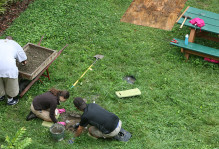Linguists as Agents for Social Change
Linguists have not been shy about promoting social change. Some linguists have centered their activism efforts on language policy and linguistic rights, and others have worked on social and political activism that falls outside of the realm of linguistics altogether. Such work includes efforts from those who study language from diverse perspectives, including the Teaching English as a Second or Other Language community, speech-language pathologists, and those who work in legal policy and law enforcement. Within linguistics, groups of scholars who have been known for their activism have come under many names and have utilized varied approaches to their social action. Regardless of linguistic subfield, all linguists have much to contribute to social change.
Sociolinguists have an intimate knowledge of speakers and of variations within and across languages, and they examine closely the nuances and social correlates of languages and language variation. Knowledge about languages and language variation has had a direct impact on scholarship in education that examines variation between ethnic and social groups. Linguists have shown that languages are fundamentally equal. Linguists have demonstrated that language variation does not correlate with variations in intelligence or academic ability.
Linguists are in a unique position to help scholars and practitioners across disciplines tackle questions that intersect with issues of the social aspects of language behavior. It is crucial that linguists share knowledge with other disciplines so that we may benefit from what others already know.
Service learning is a way to make social action a crucial component of linguistics, as the study of people and their language is no longer confined to the classroom or more advanced field research. The Corporation for National and Community Service defines service learning as a method of teaching where students learn and develop through active participation in thoughtfully organized community service. The service experience is integrated into and enhances the academic curriculum of the student. Service learning courses provide structured time for the students to reflect on the service experience as it relates to their coursework, personal development, and civic involvement.
Linguists from every subfield can provide important information on the social situations of speakers of different backgrounds. Even the most introductory students can play a role in this process.
For more information see Charity (2008) Linguists as Agents for Social Change in Language and Linguistics Compass 2 (2008).




No comments.
Comments are currently closed. Comments are closed on all posts older than one year, and for those in our archive.